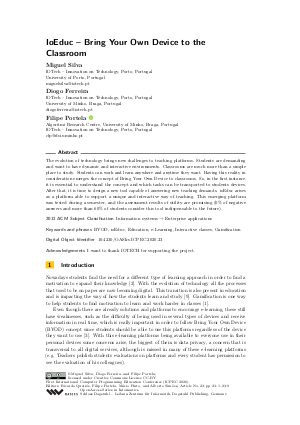IoEduc - Bring Your Own Device to the Classroom
Authors
Miguel Silva,
Diogo Ferreira,
Filipe Portela 
-
Part of:
Volume:
First International Computer Programming Education Conference (ICPEC 2020)
Part of: Series: Open Access Series in Informatics (OASIcs)
Part of: Conference: International Computer Programming Education Conference (ICPEC) - License:
 Creative Commons Attribution 3.0 Unported license
Creative Commons Attribution 3.0 Unported license
- Publication Date: 2020-06-15
File

PDF
OASIcs.ICPEC.2020.23.pdf
- Filesize: 0.58 MB
- 9 pages
Document Identifiers
Subject Classification
ACM Subject Classification
- Information systems → Enterprise applications
Keywords
- BYOD
- ioEduc
- Education
- e-Learning
- Interactive classes
- Gamification
Metrics
- Access Statistics
-
Total Accesses (updated on a weekly basis)
0PDF Downloads0Metadata Views
Abstract
The evolution of technology brings new challenges to teaching platforms. Students are demanding and want to have dynamic and interactive environments. Classrooms are much more than a simple place to study. Students can work and learn anywhere and anytime they want. Having this reality in consideration emerges the concept of Bring Your Own Device to classrooms. So, in the first instance, it is essential to understand the concept and which tasks can be transported to students devices. After that, it is time to design a new tool capable of answering new teaching demands. ioEduc arises as a platform able to support a unique and interactive way of teaching. This emerging platform was tested during a semester, and the assessment results of utility are promising (0% of negative answers and more than 60% of students consider this tool indispensable to the future).
Cite As Get BibTex
Miguel Silva, Diogo Ferreira, and Filipe Portela. IoEduc - Bring Your Own Device to the Classroom. In First International Computer Programming Education Conference (ICPEC 2020). Open Access Series in Informatics (OASIcs), Volume 81, pp. 23:1-23:9, Schloss Dagstuhl – Leibniz-Zentrum für Informatik (2020)
https://doi.org/10.4230/OASIcs.ICPEC.2020.23
BibTex
@InProceedings{silva_et_al:OASIcs.ICPEC.2020.23,
author = {Silva, Miguel and Ferreira, Diogo and Portela, Filipe},
title = {{IoEduc - Bring Your Own Device to the Classroom}},
booktitle = {First International Computer Programming Education Conference (ICPEC 2020)},
pages = {23:1--23:9},
series = {Open Access Series in Informatics (OASIcs)},
ISBN = {978-3-95977-153-5},
ISSN = {2190-6807},
year = {2020},
volume = {81},
editor = {Queir\'{o}s, Ricardo and Portela, Filipe and Pinto, M\'{a}rio and Sim\~{o}es, Alberto},
publisher = {Schloss Dagstuhl -- Leibniz-Zentrum f{\"u}r Informatik},
address = {Dagstuhl, Germany},
URL = {https://drops.dagstuhl.de/entities/document/10.4230/OASIcs.ICPEC.2020.23},
URN = {urn:nbn:de:0030-drops-123100},
doi = {10.4230/OASIcs.ICPEC.2020.23},
annote = {Keywords: BYOD, ioEduc, Education, e-Learning, Interactive classes, Gamification}
}
Author Details
- IOTech - Innovation on Technology, Porto, Portugal
- University of Minho, Braga, Portugal
Acknowledgements
I want to thank IOTECH for supporting the project.
References
- Patrick Buckley and Elaine Doyle. Gamification and Student Motivation. Interactive Learning Environments, 2014. URL: https://doi.org/10.1080/10494820.2014.964263.
- Lee Yen Chaw and Chun Meng Tang. What makes learning management systems effective for learning? Journal of Educational Technology Systems, 47(2):152-169, 2018. URL: https://doi.org/10.1177/0047239518795828.
- Carolina Costa, Helena Alvelos, and Leonor Teixeira. The use of moodle e-learning platform: A study in a portuguese university. Procedia Technology, 5:334-343, 2012. 4th Conference of ENTERprise Information Systems – aligning technology, organizations and people (CENTERIS 2012). URL: https://doi.org/10.1016/j.protcy.2012.09.037.
-
Darina Dicheva and Christo Dichev. Gamification in Education: Where Are We in 2015? In Gamification in Education: Where Are We in 2015?, 2015.

-
Darina Dicheva, Christo Dichev, Gennady Agre, and Galia Angelova. Gamification in Education: A Systematic Mapping Study. Technical Report 3, Educational Technology & Society, 2015.

-
Derrel Fincher. Bring your own device (BYOD) programs in the classroom: Teacher use, equity, and learning tools. PhD thesis, Pepperdine University, July 2016.

-
Karl Kapp. The gamification of learning and instruction: Game-based methods and strategies for training and education. San Francisco, CA: Pfeiffer. Pfeiffer, 2012.

-
A. Maia, F. Portela, and M. F. Santos. Web intelligence in higher education: A study on the usage of business intelligence techniques in education. In 2018 6th International Conference on Future Internet of Things and Cloud Workshops (FiCloudW), pages 176-181, 2018.

-
Chirag Patel, Mahesh Gadhavi, and Atul Patel. A survey paper on e-learning based learning management systems (lms). International Journal of Scientific and Engineering Research, 4:171-176, June 2013.

-
Filipe Portela. A new and interactive teaching approach with gamification for motivating students in computer science classrooms. In ICPEC 2020, 2020.

- Filipe Portela, Ailton Moreira da Veiga, and Manuel Filipe Santos. Benefits of Bring Your Own Device in Healthcare. In Next-Generation Mobile and Pervasive Healthcare Solutions, pages 32-45. IGI Global, Hershey, PA, USA, 2018. URL: https://doi.org/10.4018/978-1-5225-2851-7.ch003.
